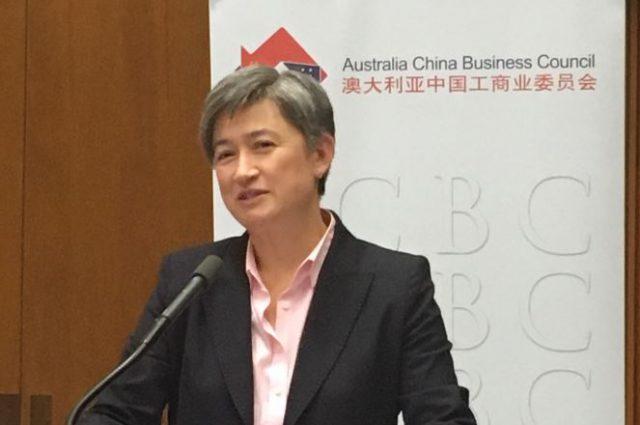
The China relationship is both a complex and crucial one. Politically and culturally, China and Australia are very different countries, and in such complex relationships, differences of approach, objective and opinion will inevitably arise.
These differences have become more apparent as China has become more confident in asserting its interests under President Xi Jinping.
Australia is entitled to assert its national interests, just as China asserts what it sees as its interests. But it’s possible for us to assert our interests and safeguard our sovereignty without being offensive and inflammatory. A more sophisticated approach, based on both respect and a firm articulation of our convictions, will do more to ensure that our national interests are maintained than will the disjointed megaphone diplomacy the government seems to have preferred of late.
Similarly, it’s also incumbent upon political, business and industry leaders to ensure they handle such debates with a degree of sensitivity and sophistication.
Australia’s diversity can be an aspect of our shared identity. Or it can be the fault line along which our community fractures. We must always guard against racial fault lines from our past being allowed to resonate today.
What the Australia–China relationship needs is stability based on mutual understanding.
If Labor forms government following the next election, we understand that some of these pressures will persist. But what the government can and should avoid is making things harder than they need to be.
There are six operating principles that Labor would apply to our management of this critical relationship.
First, our starting point is a clear understanding and articulation of our national interests. It’s better to start with a clear sense of purpose than with a set of problems.
The national interests, as we identify them, are the security of the nation and its people, the prosperity of the nation and its people, the stability of our region and constructive internationalism. Constructive internationalism is fundamental to our intention to help build, strengthen and maintain a global rules-based system that guides behaviours and relationships.
Our second operating principle is that we accept that we live in a disrupted world. To construct the world we wish to live in, we begin with the world as it is, with its fracture lines, its pressures, the persistent challenge to democracy, and the resurgence of nationalism and populism.
Our third operating principle is that we accept China as it is, not as others might perceive China to be or as China itself might represent itself. It’s a fact that China is the engine room of the Asian economy, and Asia is collectively the world’s biggest economic region.
Fourth, we need to acknowledge just how important and beneficial China’s emergence as a major economic power has been to both Australia and to the world. At the same time, we need to accord to China the priority it deserves as our major economic partner.
To the extent possible, Labor will work towards ensuring that our political relationship works on the same basis as our economic relationship—respect and trust based on dialogue and understanding. Respect and trust don’t just happen. They have to be built and maintained.
Our fifth operating principle is that we intend to pursue a coordinated and integrated approach to the many strands of our relationship with China. The Department of Foreign Affairs and Trade (DFAT) should be at the centre of this coordination—the lead department for managing the relationship and for managing a whole-of-government China strategy.
DFAT will need to draw on the analytical strengths of the Office of National Assessments and other agencies if we’re to acquire a greater understanding of China’s economic dynamics, its strategic aspirations and the way these link together to expand its geoeconomic power.
DFAT should also play an important role in ensuring that all parts of government have the same understandings and are working towards the same goals. The work done by all departments needs to be integrated and mutually reinforcing. It cannot be at cross-purposes.
And our sixth operating principle is to work constructively with China and others in a regional framework. ASEAN’s institutions, and the way it manages its institutions, offer other countries, such as China and Australia, an important mechanism for enhancing regional stability and prosperity.
Given the historical significance of the events that occurred in Singapore last week, it’s important that we recognise that our region needs the ongoing commitment of the US. As the world’s only global power, the US has a stabilising role to play in Asia.
Labor fully intends to extend and strengthen the ‘one-and-a-half track’ dialogue between China and Australia. In our view, the broader and deeper the contacts between Australian and Chinese enterprises and people are, the more robust the bilateral relationship becomes and the more consolidated the outcomes will be.
Just as Gough Whitlam, back in 1972, could identify mutual benefit at a time when fearmongering about China was the leitmotif of the McMahon government, so Labor can identify mutual benefit at a time when clumsiness and inconsistency are the leitmotifs of the Turnbull government. Whitlam’s insight, vision and confidence provided the first critical step that set Australia on the path to a relationship of great benefit to us. Our collective task—one to which Labor is committed—is to ensure that mutual benefit is continued.
Getting it right with China is a task that Labor is willing to take on, just as we have in the past. We approach our relationship with China confidently. Our approach is deliberate and measured, aiming to advance the relationship and dealing with difficulties when they arise. And we conduct our relationship with China not at the expense of any other relationship. We do not see it in binary terms, but in a network of relationships that we pursue on the basis of a clear understanding of what our national interests are.